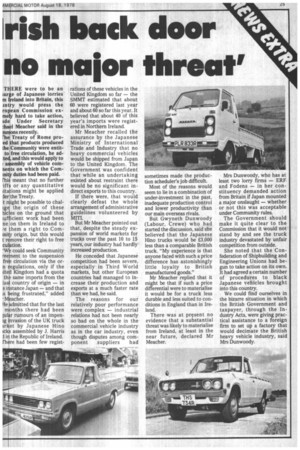ish back door o major threat'
Page 27

If you've noticed an error in this article please click here to report it so we can fix it.
T ERE were to be an iur e of Japanese lorries m I eland into Britain, this int y would press the ropean Commission exmei)/ hard to take action, ide Under Secretary !hai Meacher said in the m ons recently.
L'he Treaty of Rome proed hat products produced the Community were entitto free circulation, he ad:te i, and this would apply to a embly of vehicle comae ts on which the Comtni duties had been paid. Ch meant that no further iff or any quantitative lita ions might be applied ler the Treaty.
t ight be possible to chalLge the origin of these lie es on the ground that ;uf icient work had been ne on them in Ireland to re hem a right to Corninia origin, but this would t r move their right to free cul tion.
'W could seek Community ree ent to the suspension fre circulation via the or n iegulations, only if the Lite Kingdom had a quota th same imports from the ma country of origin — in s i stance Japan — and that Ls eing frustrated," added • M acher.
He dmitted that for the last m nths there had been p..11 r rumours of an impenig nvasion of the UK truck itet by Japanese Hino Lc assembled by J. Harris Ii the Republic of Ireland. Ch re had been few regist rations of these vehicles in the United Kingdom so far — the SMMT estimated that about 60 were registered last year and about 60 so far this year. It believed that about 40 of this year's imports were registered in Northern Ireland.
Mr Meacher recalled the assurance by the Japanese Ministry of International Trade and Industry that no heavy commercial vehicles would be shipped from Japan to the United Kingdom. The Government was confident that while an undertaking existed about restraint there would be no significant indirect exports to this country.
If there were, that would clearly defeat the whole arrangement of administrative guidelines volunteered by MITI.
But Mr Meacher pointed out that, despite the steady expansion of world markets for trucks over the past 10 to 15 years, our industry had hardly' increased production.
He conceded that Japanese competition had been severe, especially in Third World markets, but other European countries had managed to increase their production and exports at a much faster rate than we had, he said.
The reasons for our relatively poor performance were complex — industrial relations had not been nearly so bad on the whole in the commercial vehicle industry as in the car industry, even though disputes among component suppliers had sometimes made the production scheduler's job difficult.
Most of the reasons would seem to lie in a combination of under-investment in the past, inadequate production control and lower productivity than our main overseas rivals.
But Gwyneth Dunwoody (Labour, Crewe) who had started the discussion, said she believed that the Japanese Hino trucks would be £3,000 less than a comparable British truck. "My experience is that anyone faced with such a price difference has astonishingly little loyalty to British manufactured goods."
Mr Meacher replied that it might be that if such a price differential were to materialise it would be for a truck less durable and less suited to conditions in England than in Ireland.
There was at present no evidence that a substantial threat was likely to materialise from Ireland, at least in the near future, declared Mr Meacher. Mrs Dunwoody, who has at least two lorry firms — ERF and Fodens — in her constituency demanded action from Britain if Japan mounted a major onslaught — whether or not this was acceptable under Community rules.
The Government should make it quite clear to the Commission that it would not stand by and see the truck industry devastated by unfair competition from outside.
She noted that the Confederation of Shipbuilding and Engineering Unions had begun to take action on its own. It had agreed a certain number of procedures to black Japanese vehicles brought into this country.
We could find ourselves in the bizarre situation in which the British Government and taxpayer, through the Industry Acts, were giving practical assistance to a foreign firm to set up a factory that would decimate the British heavy vehicle industry, said Mrs Dunwoody.
















































































































